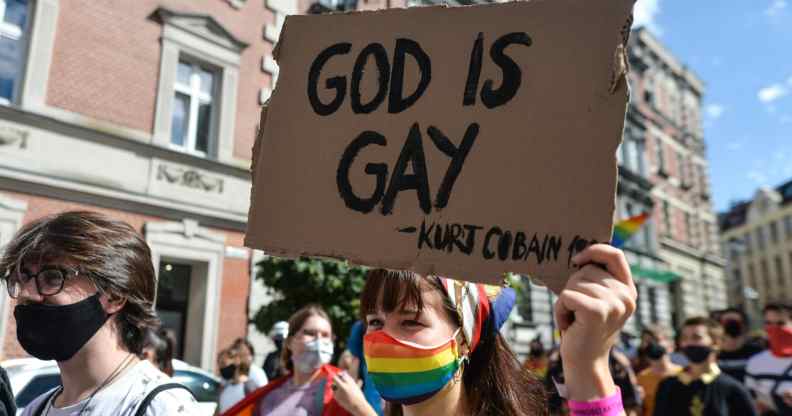Conservative Christians genuinely believe that LGBT+ progress is a personal attack, study shows

An activist carries a placard saying ‘God Is Gay’ during Katowice Pride Parade in Poland. (NurPhoto via Getty/ Artur Widak)
Anti-LGBT+ conservative Christians in America genuinely believe that progress for LGBT+ rights and representation is an attack on their religion, a study has shown.
Researchers at Washington University in St Louis, Missouri, published their findings in the Journal of Personality and Social Psychology.
Through five studies over three years, researchers “examined the causes and consequences of zero-sum beliefs about Christians and LGBT+ individuals”.
Clara L Wilkins, principal investigator and associate professor of psychological and brain sciences, said: “Many Christians have come to see themselves as being on the losing side of the culture wars.
“Christians may perceive that an America where same-sex marriage is legal is one in which they have lost their sway and are now victimised.
“This is especially common among conservative Christians, who also are more likely to believe that Christianity is a defining feature of being American.
“As a result, they see themselves as being at odds with LGBT+ individuals, who are perceived as having increasing social influence.”
For four of the studies, around “2,000 self-identified, heterosexual, cisgender and predominately white Christian Americans” were surveyed.
Researchers found that conservative Christians tended to believe that reduced bias against LGBT+ people would result in increased bias against Christians.
In one of the studies, when Christians were asked to “reflect on their religious values”, they “reported an increased level of perceived conflict with LGBT+ people”.
Researchers also found that the zero-sum beliefs of Christians in the study were based on “symbolic threats” rather than realistic ones.
For example, they weren’t worried about a real-life threat to their livelihoods, rather a broader threat to “their ability to instil and enforce their notions of Christian values upon society”.
In the fifth study, researchers spoke to members of the United Methodist Church (UMC) after the denomination voted in 2019 to uphold a ban on LGBT+ clergy and same-sex marriages.
This study showed that institutions play a huge role in “shaping prejudice”, as after the vote, “the relationship between zero-sum beliefs and prejudice became stronger, which suggests that UMC Christians may have felt sanctioned to express their bias because of the institutional decision”.
Researchers identified an ‘intervention’ to help reduce levels of prejudice in conservative Christians
However, the study did provide some light at the end of the tunnel, with researchers proving that “faith communities, clergy and elected officials can harness religious values not for discrimination, but for public virtue and acceptance”.
When asked to read a Bible passage about acceptance, fundamentalists did not change their views, but “mainline Christians… were significantly less likely to endorse zero-sum beliefs”.
They also reported greater support for same-sex marriage and less prejudice against queer people.
Researchers wrote: “Our data suggests that perceived conflict between groups is not inevitable.
“In fact, we were able to successfully lower the extent to which mainline Christians perceive that LGBT+ gains come at a cost for Christians by having them reflect on biblical acceptance… In other words, we identified an intervention to successfully lower zero-sum beliefs for most Christians.”

